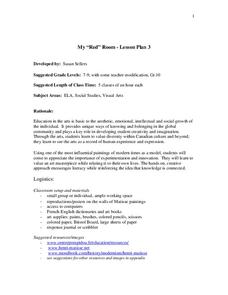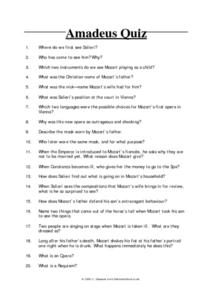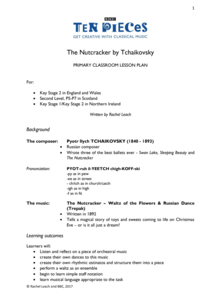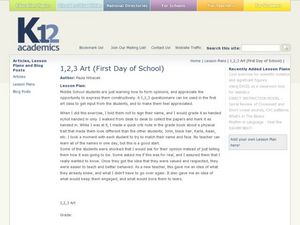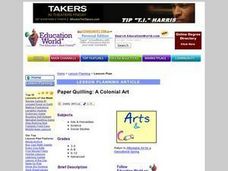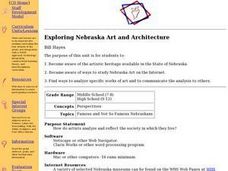Curated OER
My "Red" Room
Students utilize art analysis skills by examining the work of Henri Matisse. In this painting lesson, students examine L'Atelier Rouge by Henri Matisse and identify the objects in the room and colors used. Students create their own rough...
Curated OER
Still Life Painting: Arranging Nature
Students display the two still-life paintings they created along with their artist’s statement, write a review of a peer’s work, and discuss all of the paintings in a group critique. In this still life art instructional activity,...
Curated OER
Abstract to Real: The Human Form in Art
Students analyze and evaluate the effects of abstraction and realism on depictions of the human form in ancient and modern-day cultures.
Curated OER
Band On Line
In 1996, using the Internet to enhance learning was a new innovation. While the instructional activity here is a bit outdated, it could still provide a basic understanding of how technology can enhance music appreciation. Members of the...
Curated OER
Music Patterns
Little ones can listen and follow along with the images to practice making rhythmic patterns. They clap and play to a variety of simple beats. This is a great way to build coordination, listening skills, pattern recognition, and music...
Curated OER
"Eine Kleine Nachtmusik"
Mozart was an amazing composer and "Eine Kleine Nachtmusik" was one of his best-loved orchestral pieces. This handout provides a brief description of the instruments for which it was written, and how each section and part should be...
Curated OER
Amadeus Quiz
Get out the text-book, and CD player to teach a lesson on Mozart. Afterward, you can administer this quiz which requires learners to complete 20 short-answer questions related to Mozart's life, operas, music, and general music terminology.
Curated OER
Peter and the Wolf: A Russian Fairy Tale
A wonderful presentation explains a musical fairy tale. Perfect for an independent work station or as a link to send home for homework, this slideshow comes equipped with full audio. Each character, theme, and instrument from the piece...
Curated OER
GCSE Notes 2000: Classical Music
Classical period music is defined by its characteristics and distinctive sound. A set of notes assists upper graders in recalling and analyzing music from the classical period based on musical terminology. An example analysis of Eine...
Concordia College Archives
Our School Song
Show your school spirit! Class members use instruments or sing along and employ what they have learned in the two previous lessons to perform their school's songs.
BBC
The Nutcracker by Tchaikovsky
Over the course of six lessons, scholars try their hand at composing and dancing after a thorough examination of the famous ballet, The Nutcracker, by Tchaikovsky. Participants watch and discuss the performance of two dances, create and...
Smithsonian Institution
Spirits Across the Ocean: Yoruban and Dahomean Cultures in the Caribbean Brought by the Slave Trade
Much of Latin American music owes its origins to the slave trade. Peoples from the Yoruban and Dahomean cultures brought with them the distinctive rhythms, time signatures, and eighth note patterns that now characterize Caribbean music....
Smithsonian Institution
Braiding Rhythms: The Role of Bell Patterns in West African and Afro-Caribbean Music
Africans transported to the Caribbean as part of the transatlantic slave trade brought with them a rich tradition of music and dance. Four lessons teach young musicians the rumba clave rhythm, cascara rhythm, and the 6/8 bell patterns...
Smithsonian Institution
African American Music: Let’s Sing and Play Clapping Games
Two lessons focus on making a beat. Using popular African American music of its time, scholars listen and analyze the rhythm then recreate it with hands drums, and cups.
Smithsonian Institution
Jamaican Song, Dance, and Play: Experiences with Jamaican Musical Traditions
Young musicians experience song, dance, and play of the Jamaican culture. Scholars listen for and recreate beats, they play tunes, make up original dances, and play a game that challenges pupils to pass stones to a specific beat.
Curated OER
Calendar Art
This is an integrated visual arts lesson in which the pupils will assemble and decorate a calendar. This is a lesson to be used at the beginning of each month to make a calendar for the month. Math concepts for this lesson will consist...
Curated OER
1,2,3 Art (First Day of School)
Pupils participate in a first day of school survey. For this art lesson, students answer three questions about art class, such as one thing they don't like about art class and their goals for art this coming year.
Curated OER
Everyday Objects as Art
Students interpret works of art by Keith Haring, Robert Rauschenberg, and Marcel Duchamp.
Curated OER
Paper Quilling: A Colonial Art
Students discover the art of paper quilling and rolled paper. As a class, they identify patterns and forms found in nature. They create their own piece of quilled art and view their classmates creations as well.
Curated OER
Jim Frankoski Lesson Plan Ideas
Students read about Jim Frankoski and his art to examine various elements in environmental art. In this art analysis lesson plan, students analyze the location of photographs and how images create illusions that capture new viewpoints.
Curated OER
Storybook Art
Students read the book Swimmy, by Leo Lionni. They study his method of illustrating and then create an underwater scene of their own using the same method.
Curated OER
Poetry And Me
Third graders create visual poems using crayons, making a connection to an important aspect or event in their lives.
Curated OER
Exploring Nebraska Art and Architecture
Students explore the art and architecture of Nebraska. Using the internet, they view artwork by various artists and analyze it by using a form given to them by their teacher. They share their analysis with their classmates and discuss...
Little Bit Studio
Bugs and Buttons 2
Playing with bugs and buttons has never been so much fun! Offering a variety of different activities, this is a great resource for developing basic skills in preschool and kindergarten-aged children.


